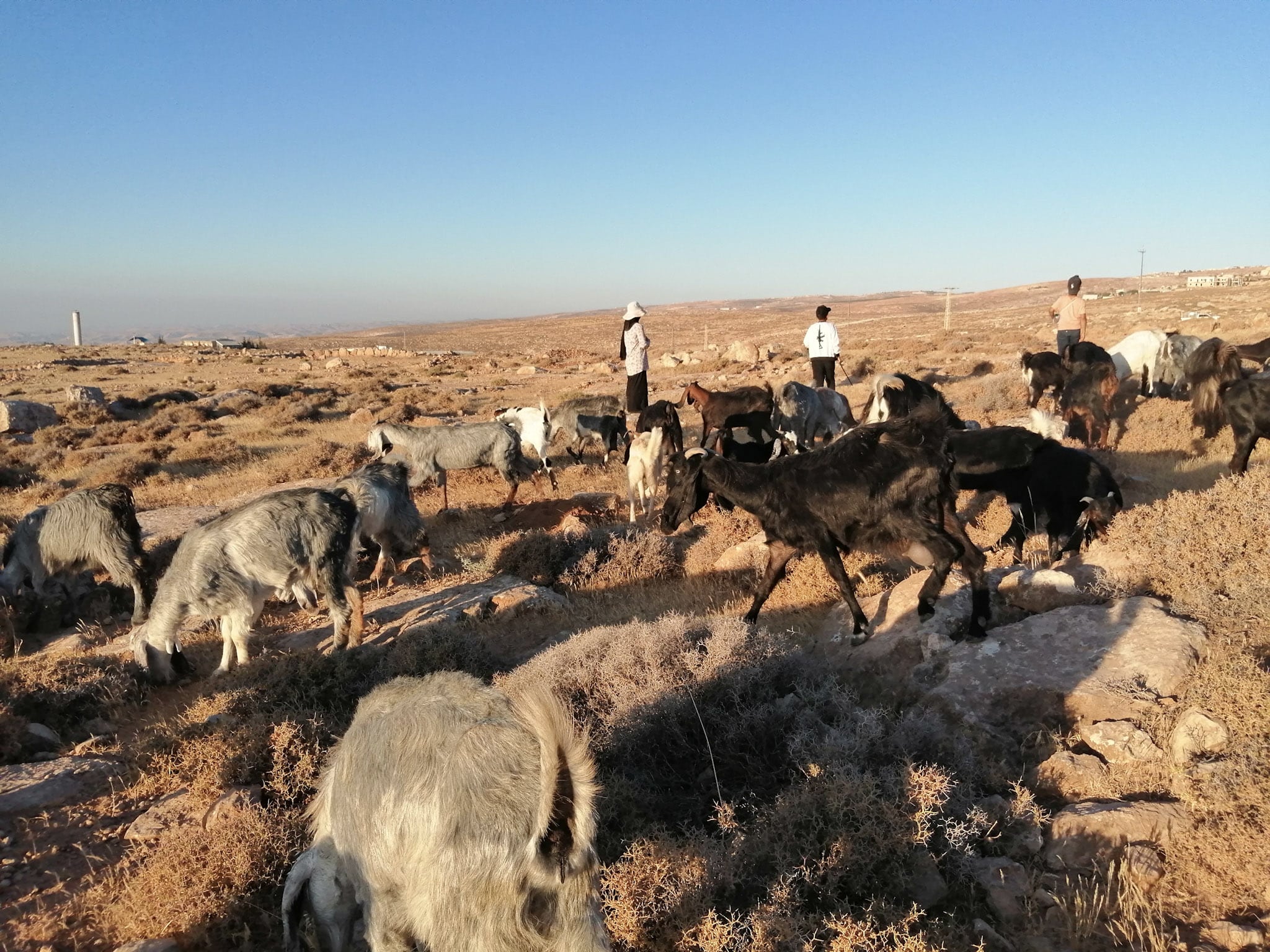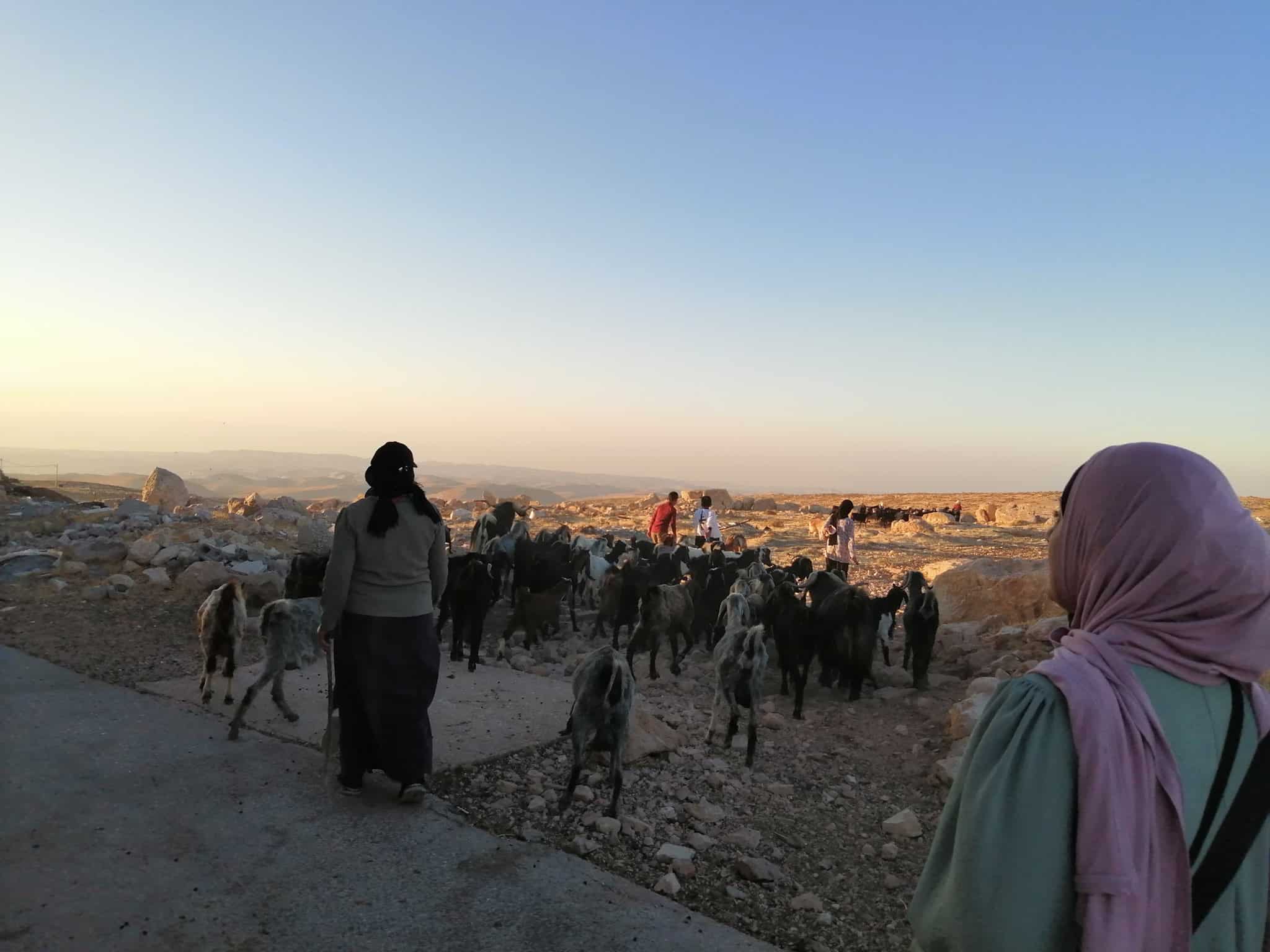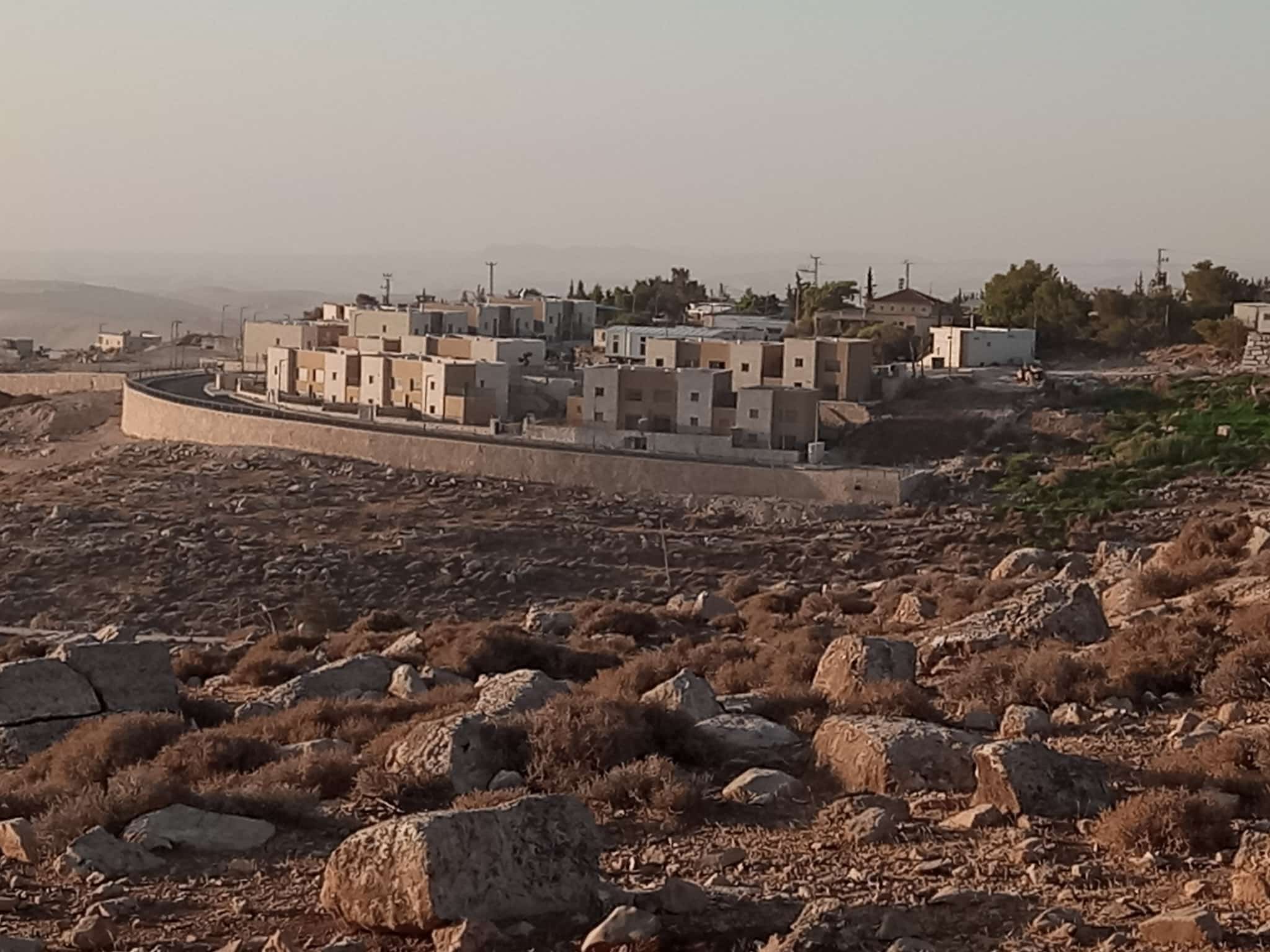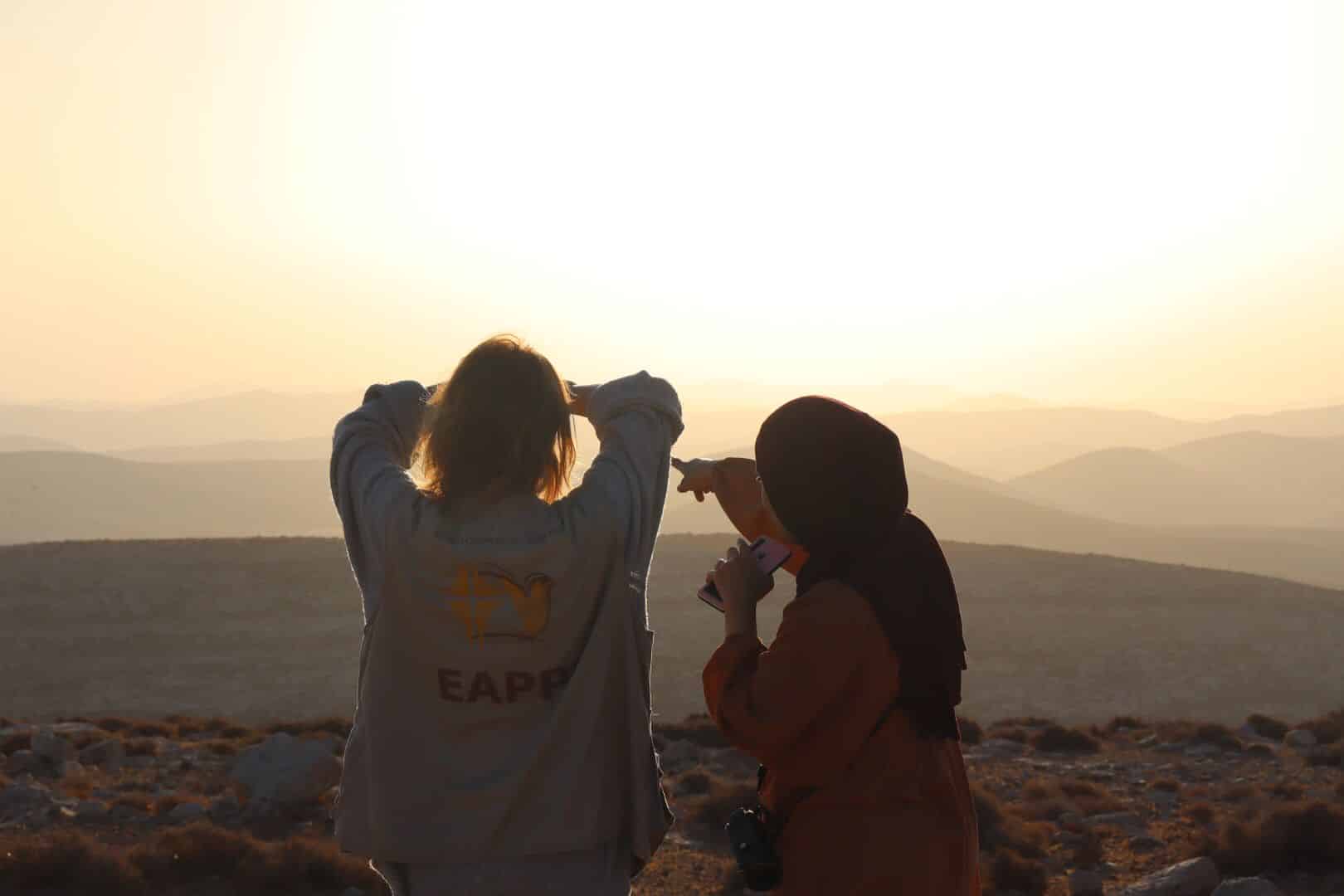‘We want to have an agricultural association for the shepherds and to stand up for this land.’
Samaher, Kisan, Bethlehem
As the dawn breaks, the first of the flocks appear between the houses and the concrete of Kisan, within seconds the remaining flock of 30-40 goats and Samaher, the shepherd with her working dogs emerge, walking towards the rocky planes. As we walk towards the rising sun in the East, the Dead Sea barely visible in the distance, more shepherds with their flocks of goats and sheep emerge from behind the hills.

The shepherds and their goats
On the outskirts of Bethlehem lies the village of Kisan. The rocky terrain and the hills and valleys surrounding the village is perfect for shepherding goats and sheep, which has been done for generations here. Samaher is part of a newer tradition of female shepherds, which is not so typical in Palestine. She is a mother of ten children, and has spent her life in the village of Kisan. Her wide confident smile shows off her strong and playful character. Clad in a straw hat to protect her eyes from the exposed sun, over a black headscarf with a colorful mid-length dress over trousers, bright socks and trainers, a uniform of traditional modesty and functionality.
With the milk from her goats, Samaher produces butter, yoghurt, cheese and ghee at her home which she then sells in the markets in Bethlehem. Although there is not much money to be made from shepherding, it is a welcome addition to her husband’s salary.
‘When we work with the goats, we don’t get a lot of money but when the men work in settlements and in Jerusalem, the women tend to the goats.’
Samaher, Kisan, Bethlehem
We reported in an earlier eyewitness story that due to the impact of the Israeli occupation on the Palestinian economy, many Palestinians have no choice but to work on Israeli settlements or commute through military checkpoints to work in Jerusalem or Israeli cities. Speaking of what her husband thinks about her shepherding work, Samaher says;
‘the men have the same opinion, because we must fight for everything, for life.’

The female shepherds head out to gaze their flocks
As much of the world looks to more sustainable forms of agriculture that support biodiversity, the grazing methods Samaher and the other shepherds use are some of the most ancient. They are the most enriching for flora and fauna to thrive, which in turn supports other forms of life to survive and thrive.
Across the valley, lies the settlement of Ma’ale Amos. This modern settlement, which is illegal under international law, consists of rows of identical whitewashed houses with green, manicured, compact gardens. Four years ago, a settler from Ma’ale Amos requested land to graze his goat, and so the Israeli authorities agreed to rent the Palestinian land surrounding the settlement to him.

The settlement of Ma’ale Amos
‘All the area is being confiscated where I need to go to tend my goats.’
Samaher, Kisan, Bethlehem
Samaher believes that having an international presence in Kisan has reduced the risk of violence from Israeli settlers and soldiers;
‘before your organisation came to accompany the shepherds, the military and settlers attacked the shepherds with dogs and with sticks.’
In a recent example of the violence that threatens Samaher and the other villagers, on 18 October 2022, while supporting farmers from Kisan with their olive harvest, a 70- year- old Israeli peace activist was stabbed and another beaten with a club by settlers from Ma’ale Amos settlement. The incident was reported in Israeli media.

Sabah, a friend of the shepherds shows EAs the land and the settlement
Kisan is situated within what has been designated as ‘Area C’, which makes up more than 60% of the West Bank. This designation, which was agreed during the Israeli-Palestinian peace process of 1993-5, the Oslo Accords, placed Area C under temporary Israeli authority. It was agreed that this would last no more than five years and would enable Israel to oversee the withdrawal of troops and effectively end their decades-long military occupation of the area.
However, almost thirty years on from this peace agreement, Israel has not left Area C and has instead used this authority to expand Israeli presence here, building a growing number of settlements, at an enormous cost to the Palestinian population.
Samaher’s experience of having her land confiscated and given to a settler is repeating itself throughout the area. Israeli human rights organisation, Yesh Din describe this as the ‘Israelization’ of Area C.
‘Israel’s attempts to obscure or erase the borders of the oPt by normalizing non-military Israeli presence in the West Bank is a grave breach of international law and a severe, extensive violation of the human rights of the indigenous Palestinian population.’
Palestinian land is being occupied by settlers with the protection of the Israeli military, while there is virtually no legal recourse open to Palestinians. The state of Israel asserts that only ‘public land’ is given for settlements and as the settlers are Israeli citizens, they have a right to protection from the military.
The confiscation of this land by the Israeli authorities means the shepherds are now restricted to only some of the land formerly available to them and their flocks, which means the land is becoming overly grazed.
When asked about her connection to this landscape, Samaher responded;
‘sometimes when you have rest, you can think about this (the sunrise, the spring) but when I now go to tend [the goats], all the time inside, I am very sad, because I see all the land confiscated and all the time, I think about this… when I see my land being confiscated, I don’t love the sunrise and I don’t love the spring… because all of this is not for me, it’s for the occupation.’
Despite all the challenges facing the shepherds of Kisan, Samaher and her fellow shepherds are looking to the future: ‘We want to have an agricultural association for the shepherds and to stand up for this land’.
Take action!
-
Use our quick template letter to send this eyewitness story to your elected representatives and ask them to call for increased pressure on the Israeli government to cease the building of Israeli settlements, which are an obstacle to peace and illegal under international law.
-
Consider visiting Palestine and Israel to see the land for yourself and to learn more about the ancient farming practices in the West Bank. Organisations such as Zaytoun organise olive picking trips each year. For more ideas on how to visit, go to our take action page.
-
Read and share this report by Israeli human rights organisation, Yesh Din, published in October 2022: Over the Border: The institutionalised Israelization of Area C and the violation of Palestinians’ human rights

